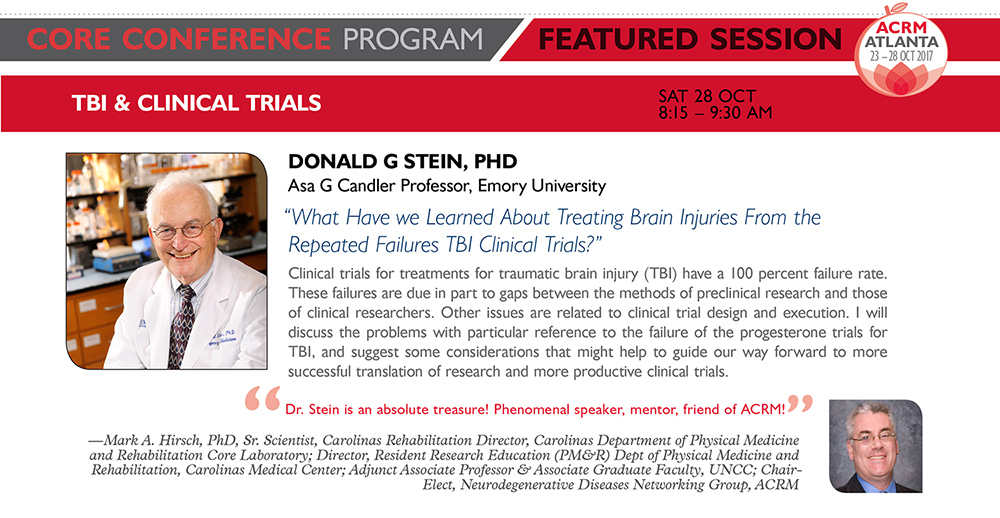
FEATURED SESSION: TBI & Clinical Trials
SAT 28 OCT // 8:15 AM – 9:30 AM
“What Have We Learned About Treating Brain Injuries From the Repeated Failures of TBI Clinical Trials? Is There a Path Forward?” #334309
PRESENTER
Donald G. Stein, PhD
Asa G. Candler Professor, Distinguished Professor
Emory University
FOCUS AREAS
Brain Injury, Clinical Practice
DESCRIPTION
Clinical trials for treatments for traumatic brain injury (TBI) have a 100 percent failure rate. These failures are due in part to gaps between the methods of preclinical research and those of clinical researchers. Other issues are related to clinical trial design and execution. I will discuss the problems with particular reference to the failure of the progesterone trials for TBI, and suggest some considerations that might help to guide our way forward to more successful translation of research and more productive clinical trials.
LEARNING OBJECTIVES
- Identify some of the primary problems with animal studies that have prevented effective translation to clinical trial and development of safe and effective neuroprotective treatments
- Analyze why TBI and stroke trials have such a dismal rate of failure and what makes them different from other clinical indications
- Identify some steps that can be taken to improve the situation
ABOUT DR STEIN
Now engaged in full-time translational neuroscience research and teaching, Dr. Stein previously served Emory as Vice Provost for Graduate Studies, Dean of the Graduate School of Arts and Sciences and interim Vice President for Research. Stein was also Vice Provost for Research and Dean of the Graduate School at Rutgers University, Newark, and adjunct professor of Neurology at the University of Medicine and Dentistry of New Jersey.
Stein’s research has focused on recovery of function after traumatic injury to the brain since the 1960s. His group was one of the first to demonstrate sex differences in the outcome of severe experimental brain injury, findings which led to decades of research on neurosteroid actions in brain repair. His current investigations show that progesterone promotes functional recovery by reducing cerebral edema and other effects of inflammation and tissue breakdown across the spectrum of development. His group works with colleagues in chemistry, emergency medicine, neurology, radiology, pediatrics and neuro-ophthalmology. Stein is the author of over 400 papers, book chapters, and reviews on recovery from brain injury, has authored or edited more than a dozen books on the topic, and lectured nationally and internationally.
ACRM Annual Conference, Progress in Rehabilitation Research (PIRR#2017)
CORE: 25 – 28 OCT 2018 // HILTON ATLANTA, USA // PRE-CONFERENCE 23 – 25 OCT
REGISTER ONLINE HERE or Register by Phone: +1.703.435.5335
 |
 |
 |
 |











